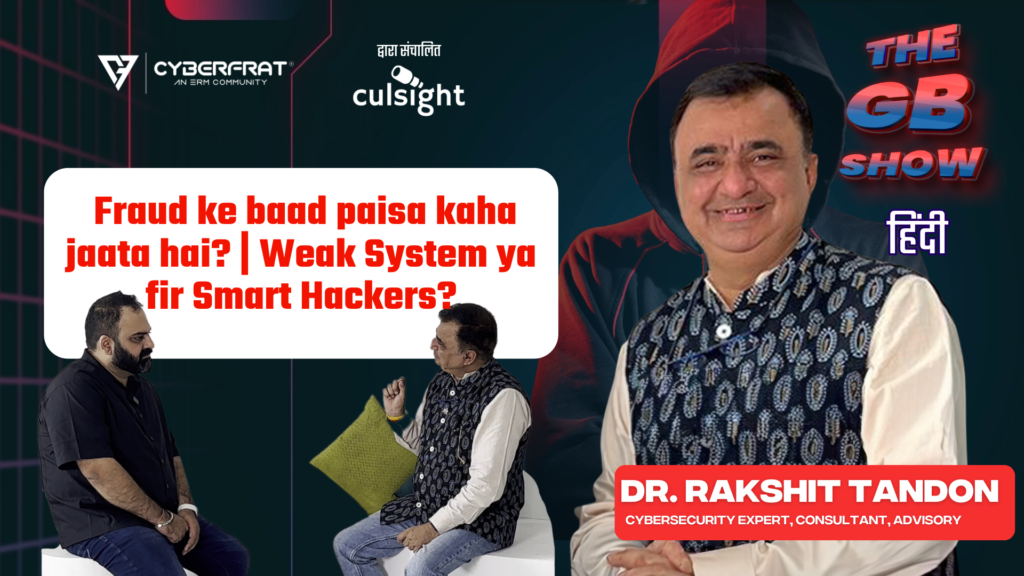
Virtual World: It’s not a game, It’s your life stay safe! – Rakshit Tandon
The rise of cyber frauds is alarming. From fake apps to cryptocurrency scams, cybercriminals have become increasingly sophisticated, preying on unsuspecting victims. Dr. Rakshit Tandon, a renowned cybersecurity expert, sheds light on these evolving threats in his recent podcast. This blog focuses on his insights, highlighting real-life cases and offering practical advice to stay safe online.
How Do Frauds Happen?
Cyber frauds can take many forms, but they often follow a similar pattern. Scammers lure victims with promises of easy money, using social media, fake apps, and phishing emails. They exploit human psychology, creating a sense of urgency and fear to manipulate their targets. Here are some common tactics:
1. Social Media Scams:
Scammers use platforms like Instagram and Facebook to promote get-rich-quick schemes, fake investment opportunities, and fraudulent job offers.
Example: A scammer offers a high-paying work-from-home job but demands an upfront fee for training materials.
2. Fake Apps and Telegram Groups:
Fraudsters create counterfeit apps and groups to steal personal information and money.
Example: A fake cryptocurrency trading app that promises high returns but vanishes with users’ investments.
3. Deepfakes and Impersonation:
Using deepfake technology, scammers create realistic but fake videos and audio recordings to impersonate trusted individuals.
Example: A scammer uses a deepfake voice of a loved one to demand ransom from unsuspecting family members.
4. Ransomware Attacks:
Cybercriminals lock victims out of their systems and demand payment to restore access.
Example: A hacker encrypts an IT company’s data and demands ransom, threatening to leak sensitive information if not paid.
5. Data Breaches and Weaponization:
Stolen data is sold on the dark web or used to blackmail individuals and organizations.
Example: A hacker breaches a company’s database, stealing customer information and demanding ransom to prevent its release.
Where Does the Money Go?
Once the money is stolen, it often disappears into a complex web of anonymous transactions. Here’s how:
1. Cryptocurrency Laundering:
Stolen funds are converted into cryptocurrencies like Bitcoin, making them harder to trace. Money from a phishing scam is converted to Bitcoin and transferred through multiple wallets to obscure its origin.
2. Hawala Transactions:
An informal money transfer system, often used for its anonymity and speed. Stolen funds are transferred via hawala networks, bypassing traditional banking channels and making detection difficult.
3. Blockchain Technology:
Criminals exploit the decentralized nature of blockchain to hide their tracks. Using multiple blockchain wallets to break the transaction chain, making it nearly impossible to trace the original source.
The Rise of Cyber Crimes
Cybercrimes have surged, especially post-COVID-19, as more people rely on digital platforms. Notable cases include:
1. Child Sexual Abuse Material:
Increased online activity has led to a rise in exploitation cases. Indian CBI’s raids uncovering networks using abusive pictures for ransom.
2. Gaming Addictions and Crimes:
Addiction to online gaming has led to new forms of cybercrimes. Kids addicted to gaming fall prey to scams promising in-game rewards.
3. High-Profile Hacks:
Even top IT executives and government officials are not immune. An IPS officer’s phone was hacked, and the hacker demanded a ransom of huge amount.
Cyber frauds are a growing threat, but with awareness and proper practices, you can protect yourself and your loved ones. Dr. Rakshit Tandon emphasizes the importance of cyber hygiene and staying informed about the latest threats. Remember, in the digital world, knowledge is power. Use strong passwords, keep personal information off your phone, and be cautious of unsolicited calls and messages. Never store sensitive documents as screenshots on your phone.
Don’t let scammers outsmart you – empower yourself with knowledge and stay safe online!
Listen to Episode 3 of “THE GB SHOW HINDI” by CyberFrat, featuring Dr. Rakshit Tandon, for more in-depth analysis and expert advice on combating cyber frauds. Subscribe, like, and hit the notification bell to stay updated on our latest content.
Notifications